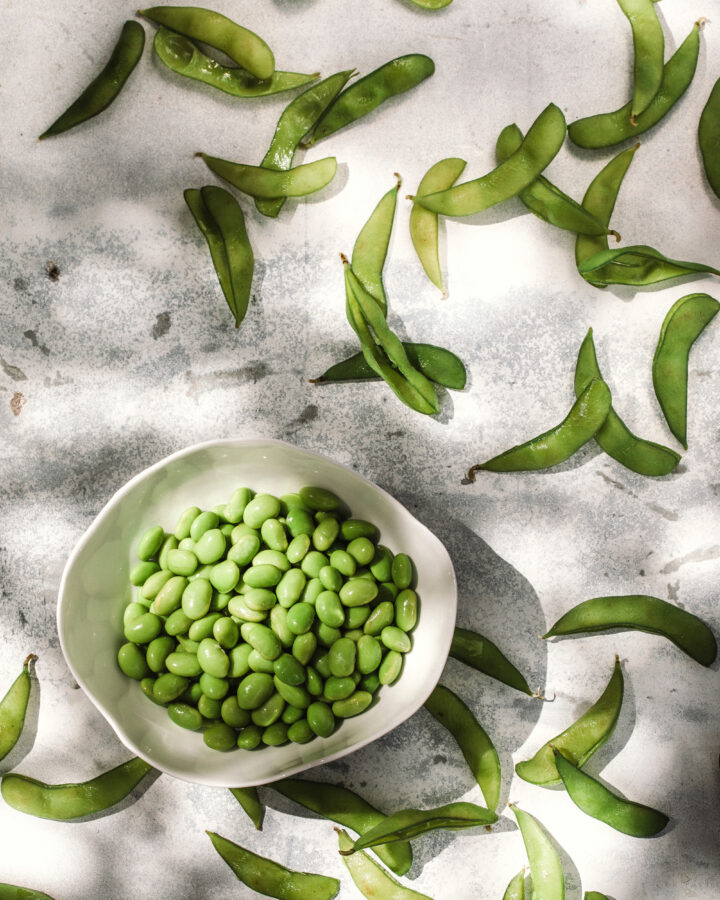Plant vs. Animal Protein: The Longevity Advantage You Need to Know

New studies reveal why shifting your protein ratio toward plant-based sources may be the key to living stronger, longer.
When most people think of protein, steak, chicken, and eggs come to mind. These foods build muscle and fuel energy, and are the go-to option for most people looking to build muscle, boost energy, and fend off illness. But new research suggests they may not be the best choice for long-term health. As we age, the type of protein we eat could determine not just how strong we feel, but how long we live.
A groundbreaking 2025 study shows that prioritizing plant protein over animal protein may reduce the risk of chronic disease and extend [helth-span]nounThe number of years you live in good health, free from chronic illness or disability.Learn More, particularly in your 50s, 60s, and beyond. The key isn’t cutting meat completely; it’s finding the right balance. Here’s what the science says about plant vs. animal protein and how adjusting your ratio can support [lon-jev-i-tee]nounLiving a long life; influenced by genetics, environment, and lifestyle.Learn More.
Why Protein Quality Matters for Longevity
A 2025 study published in Nature Communications found that a higher intake of plant-based proteins was associated with lower mortality rates in adults. And that effect got stronger as the population aged—people in their 70s may have the most to gain from shifting to a diet higher in plant-based protein.
In short, shifting your protein intake toward plant-based sources—especially as you age—can help boost your longevity.
Previous research has also shown that getting more of your protein from plants can reduce your chances of chronic disease like Type-2 diabetes, cardiovascular disease, coronary artery disease, and dementia.
That means plant proteins can help you live a longer, healthier, more fulfilling life. And you can get started by making just a few changes to your weekly diet.
Plant Protein and Longevity: What the Research Shows
On a molecular level, protein is protein. No matter where it comes from, it’s made up of the same molecules—amino acids. So why is plant protein such a longevity-boosting powerhouse?
Let’s take a look at the foundational difference between animal and plant proteins:
- Animal proteins are typically “complete” proteins, meaning they contain all nine essential amino acids your body can’t make on its own.
- Plant proteins are often “incomplete,” meaning they lack one or more of the essential amino acids. However, you can get all nine by eating a variety of plant-based protein sources.
But there are important differences between the foods that are high in animal and plant proteins. Those differences go beyond amino acids and have a big effect on your healthspan:
- Foods high in animal protein usually come with more saturated fat, especially red meat. High intake of saturated fat has been linked to negative health outcomes like heart disease, cancer, and overall mortality.
- High-protein plant foods tend to be lower in total fat and higher in unsaturated fats, which are associated with a range of health benefits, including better [hahrt helth]nounThe overall condition and function of the cardiovascular system, including blood pressure, cholesterol, and arterial health; critical for longevity and disease prevention.Learn More and reduced [in-fluh-mey-shuhn]nounYour body’s response to an illness, injury or something that doesn’t belong in your body (like germs or toxic chemicals).Learn More.
- Whole grains have fantastic benefits, and have been associated with decreased cardiovascular diseases like heart disease and stroke. And they’re a great source of plant-derived protein.
- Dietary fiber is great for intestinal health and may reduce cancer risk—foods that have high plant protein content also tend to have a lot of fiber.
How Much Plant Protein Should You Eat Daily?
In the 2025 study, the highest survivorship rates at age 60 were noted among people who were consuming around 130g of protein every day, with almost two-thirds of that coming from plants. That’s around 45g of animal protein and 85g of plant protein per day.
A 2024 study backs that up, saying that a 1:2 ratio of plant to animal protein could be effective in preventing cardiovascular disease, while a ratio closer to 1:1 is better for preventing coronary heart disease.
(For reference, the average American intake is around a 1:3 ratio of plant-to-animal proteins.)
There are lots of different recommendations for overall protein intake, though we’re fans of keeping things simple with the 30-gram rule at Super Age.
The important thing to remember from this particular study is that shifting away from animal-derived proteins and toward plant-based ones, especially as you age, can be an important part of leading a long, healthy life.
How to Choose the Healthiest Animal Protein
This isn’t about cutting meat out completely; it’s about optimizing the amount of animal proteins you eat. Choosing smarter sources of animal protein can help you reduce inflammation, support heart health, and get more nutrients per bite. Here’s how to level up your plate:
- Go for Grass-Fed or Pasture-Raised:
Look for organic, grass-fed beef and pasture-raised pork or lamb. These options typically have more [oh-may-guh three fat-ee as-ids]nounEssential fats that reduce inflammation and support brain health.Learn More, higher levels of conjugated linoleic acid (CLA), and less inflammatory fat compared to conventional meat - Favor Wild Game When You Can:
Meats like elk, deer, or bison are naturally leaner and often richer in omega-3s due to their wild forage diet. - Choose Pasture-Raised or Wild Poultry:
Opt for pasture-raised chicken or turkey, or wild birds like duck or goose for a better nutrient-to-calorie ratio and cleaner fat profile. - Pick Wild-Caught Fish:
Prioritize wild-caught ocean fish over farmed fish to avoid chemical contaminants like PCBs, and increase intake of healthy long-chain omega-3s (EPA and DHA). - Avoid Ultra-Processed Meats:
Minimize intake of processed meats like bacon, sausage, and deli meats, which are linked to higher risks of heart disease and cancer
Easy Swaps to Get the Best Plant Proteins
To get to a 1:1.5 or 1:2 ratio of plant-to-animal protein, replace some of the meat you eat in a regular week with plant-based sources of protein. And swap some low-protein sides and snacks for higher-protein alternatives (with an emphasis on plants, of course).
Here are a few great places to start getting more healthspan-extending plant proteins:
- Swap tofu in for fish
- Replace your beef burger with a plant-based one
- Serve a side of quinoa in place of white rice
- Snack on nuts and seeds instead of crackers
- Emphasize whole grains over processed ones
You can also add plant-derived protein to your diet with protein powders that are made from peas or soybeans—though whole-food sources are better, especially because you get the benefits of fiber and whole grains.
Swapping meat for a plant-based alternative even a couple times a week will help you get closer to that 1:2 ratio. And emphasizing higher-protein plant options for snacks will help keep you feeling energized while increasing your fiber intake.
These easy changes will boost your plant protein intake, help you live longer, and reduce your chances of developing a range of chronic diseases. Start emphasizing plant protein today and you’ll reap the benefits for decades!
Read This Next
The information provided in this article is for educational and informational purposes only and is not intended as health, medical, or financial advice. Do not use this information to diagnose or treat any health condition. Always consult a qualified healthcare provider regarding any questions you may have about a medical condition or health objectives. Read our disclaimers.

